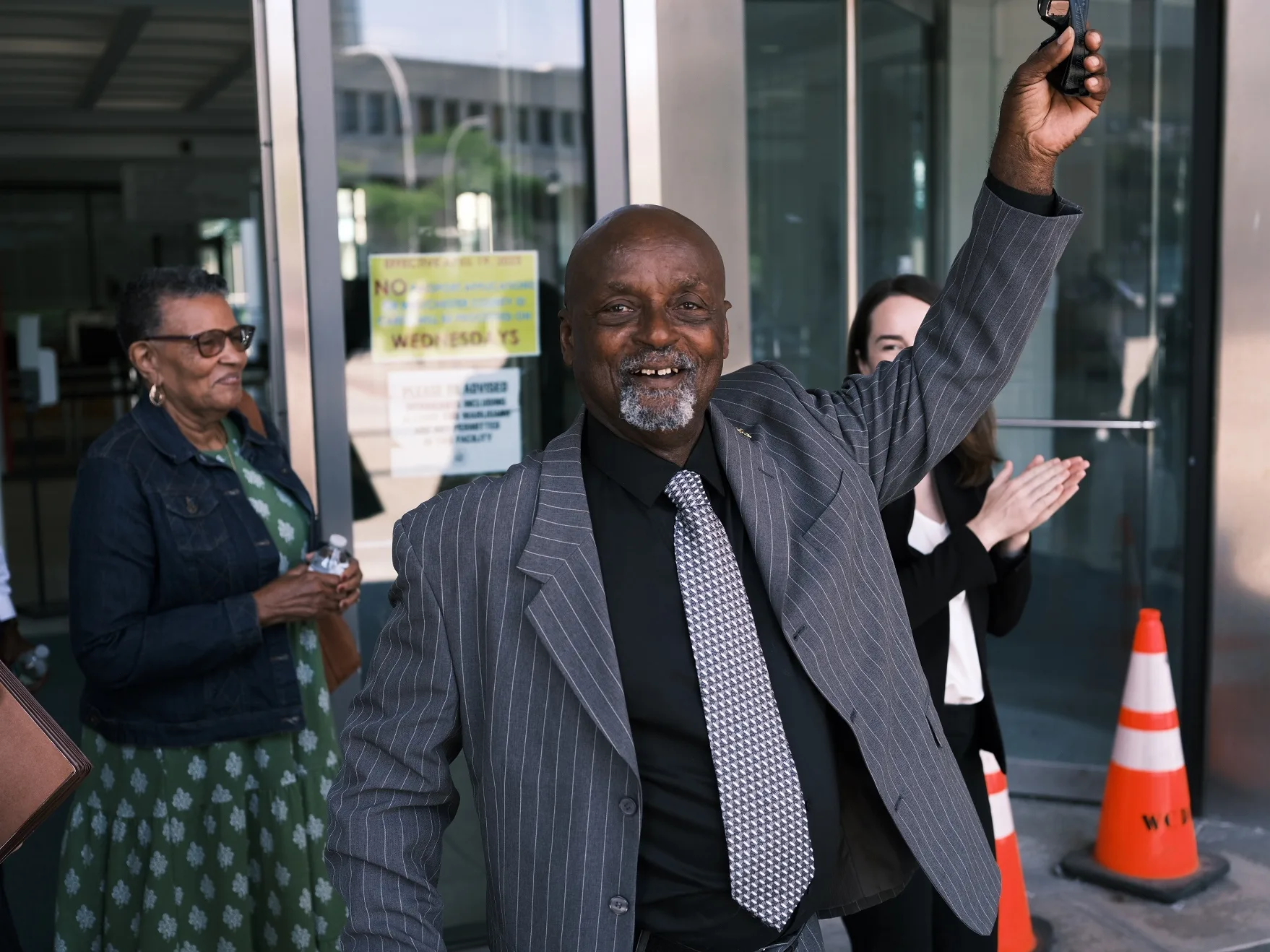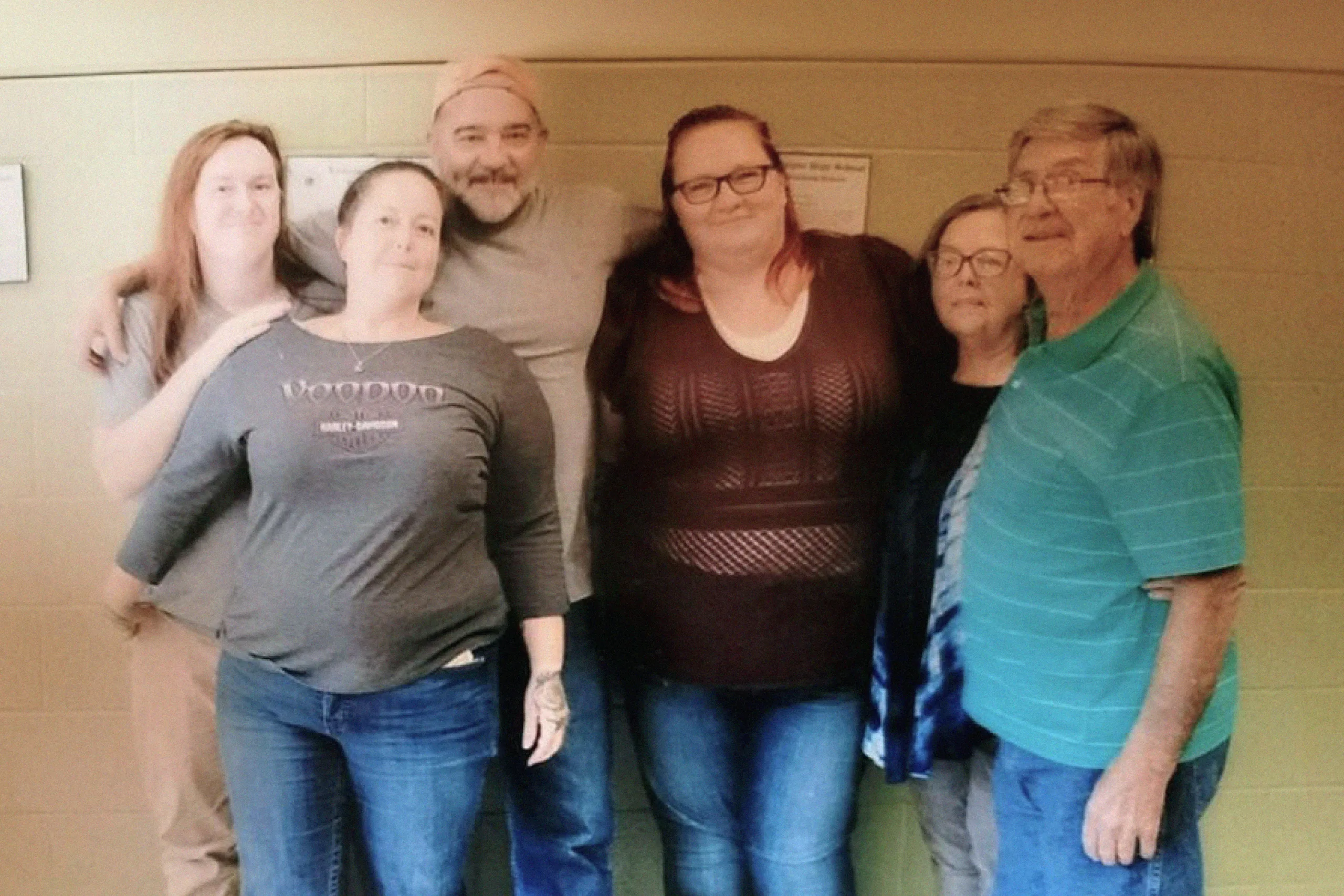
Innocence Project client Leonard Mack exonerated after 47 years in White Plains, New York on Sept. 5, 2023. (Image: Elijah Craig II/Innocence Project)
This election year, it is important that our votes be guided by a thorough awareness of political candidates' stances on criminal legal system reform.
Op-Ed 01.30.24 By Christina Swarns
As we enter this election year, many of us are reflecting on the meaning and promise of democracy. Top of mind issues include voting rights, free and fair elections, candidate integrity, and the freedom of the press. So, too, should be criminal legal system reform. Because the rule of law is a hallmark of a healthy democracy, the manner in which our criminal legal system is administered is critical.
At the Innocence Project, we work hard everyday to increase access to justice and, in so doing, we uphold fundamental democratic values. Just last year, the Innocence Project, relying on the courts and, in some cases, partnering with elected prosecutors from across the political spectrum, secured the freedom or exoneration of nine people. We also partnered with our Network colleagues to pass more than 10 critical reforms in state legislatures to prevent wrongful convictions and create fair, compassionate, and equitable systems of justice for everyone.
In recent years, we have seen an inspiring array of bipartisan movements driving policies and practices that promote integrity in the criminal legal system and buttress our democracy. That said, we have also seen fundamentally anti-democratic efforts — including arbitrary, unilateral decision-making by judges and governors — that reduce transparency, fairness, and the participatory nature of our criminal legal system processes.
Robert Kennedy once said, “Justice delayed is democracy denied.” Therefore, our electoral decisions this year (and every year) must be informed by a meaningful understanding of political candidates’ positions on criminal legal system reform issues and supported by a demonstrated commitment to upholding the rule of law in our criminal courts.
In recent years, public understanding of, and concern about, the breadth of the problem of wrongful conviction has increased. High profile exonerations — like that of Innocence Project client Muhammad Aziz, who was wrongfully convicted of the assassination of Malcolm X; highly publicized reports documenting the racial discrimination and government misconduct in wrongful convictions; and documentation of the 3,000th exoneration combined to create a public mandate for accountability.
Prosecutors, legislatures, courts, and executives responded.
Some prosecutor offices now take responsibility for addressing criminal legal system injustices. Conviction integrity units (CIUs) are teams of prosecutors that work to uncover and correct miscarriages of justice. Just last fall, the Innocence Project worked with the Westchester County District Attorney’s Conviction Review Unit (CRU) to exonerate Leonard Mack, who was wrongly convicted of a 1976 rape he did not commit. His was one of the more than 700 exonerations produced by such specialized units since 1989. When properly staffed, resourced and led by district attorneys who are truly committed to rigorous and honest review of prior convictions, CIUs can be key partners in upholding the rule of law and restoring justice. They can not only secure individual exonerations, they can also conduct root cause analyses of wrongful convictions and create structural changes to prevent future tragedies.
Legislatures have also taken action to prevent future injustices. Well-publicized exonerations of people who were wrongfully convicted as children — like the Exonerated Five and Innocence Project client Huwe Burton — raised public awareness about the fact that children are uniquely susceptible to false confession. When police use deception in the interrogation of children, the risk of a false confession increases. Thus, as the number of exonerations in the United States climbed, Illinois, Oregon, Utah, and California responded by banning the practice.
Courts and governors have also (on occasion) stepped in to prevent the execution of innocent people. For example, public pressure and a growing awareness of the fact that 196 people have been exonerated since 1973 after being condemned to death have led to stays of execution and commutations of sentences for Innocence Project clients like Pervis Payne in Tennessee, Julius Jones in Oklahoma, and Melissa Lucio in Texas. Additionally, almost three years ago, then Gov. Ralph Northam abolished the death penalty in Virginia, the first Southern state to do so. Explaining his decision, Gov. Northam said, “We can’t give out the ultimate punishment without being 100% sure that we’re right. And we can’t sentence people to that ultimate punishment knowing that the system doesn’t work the same for everyone.”

Innocence Project client Leonard Mack exonerated after 47 years in White Plains, New York on Sept. 5, 2023. (Image: Elijah Craig II/Innocence Project)
This progress has also confronted major setbacks.
In Missouri, the life of Marcellus Williams — a current client of the Innocence Project, the Midwest Innocence Project, the Federal Defender for the Western District of Missouri, and private counsel — now hangs in the balance. Last year, Gov. Mike Parson, arbitrarily and without explanation, rescinded an executive order that was issued by his predecessor, Gov. Eric Greitens, creating a board of inquiry to investigate the credible evidence of Mr. Williams’s innocence. The previously ordered investigation was the product of a 1963 law that was explicitly crafted to protect innocent people from execution. But Gov. Parson dissolved the board of inquiry before it could produce a report and recommendation. And by rescinding the order, Gov. Parson lifted Mr. Williams’ stay of execution and paved the way for Attorney General Andrew Bailey to ask the Missouri Supreme Court to schedule an execution date. The St. Louis County Prosecuting Attorney’s Office opposed that request and, after reviewing the evidence in Mr. Williams’ case, filed a motion asking the St. Louis County Circuit Court to overturn his conviction.
In Louisiana, Innocence Project client, Jimmie “Chris” Duncan, was one of 56 people on death row to petition the Board of Pardons and Committee on Parole for clemency. Mr. Duncan was convicted of murder in 1994 and condemned to death after discredited pathologist Steven Hayne and dentist Michael West offered “expert” testimony based on debunked “science” that connected Mr. Duncan to the murder of a child in his care. At the urging of Louisiana Gov. John Bel Edwards, the board agreed to conduct clemency hearings to review petitions for relief filed by people on death row, including Mr. Duncan. However, then-Attorney General and Governor-elect Jeff Landry, a staunch advocate for the death penalty, partnered with a coalition of Louisiana district attorneys to file a lawsuit against the board to prevent the clemency review. Gov. Landry and the board eventually settled the lawsuit, with the board opting to hold limited “administrative reviews” for only a small number of applicants. Faced with an abbreviated process offered to a handful of people on death row — none of whom were granted clemency — Mr. Duncan chose to withdraw his petition.

Jimmie “Chris” Duncan on Louisiana’s death row. (Image courtesy of the Duncan family)
Additionally, for many years, judges were allowed to override jury sentencing decisions in death penalty cases. For example, in Florida, Robert DuBoise was convicted of murder and sentenced to death by a judge even though his jury unanimously recommended a life sentence. He was ultimately exonerated after spending 37 years in prison, including four on death row, after the Innocence Project, the Innocence Project of Florida and the Conviction Review Unit (CRU) at the Office of the State Attorney for the 13th Judicial Circuit (led by Andrew Warren, who is discussed further below) conducted a joint reinvestigation that not only established Mr. DuBoise’s innocence but also identified the actual perpetrator. Although judicial overrides were declared unconstitutional by the United States Supreme Court, numerous people sentenced to death by judicial override remain on death row in Alabama.
Each of these cases exemplify the ways in which unilateral decisions by individual actors in the criminal legal system can undermine democracy.
In Florida, elected State’s Attorneys Andrew Warren and Monique Worrell were suspended by Gov. Ron DeSantis because the governor disagreed with their actual or proposed exercise of prosecutorial discretion. Each was replaced by a prosecutor appointed solely by the governor.
Similarly, Texas Gov. Greg Abbott and Georgia Gov. Brian Kemp passed laws granting them authority to remove “rogue” district attorneys, meaning those who exercise their prosecutorial discretion in a manner with which the governors disagree.
And in Mississippi, Gov. Tate Reeves transformed Hinds County, which includes the (predominantly Black) city of Jackson, into the only municipality in the state that does not elect its own prosecutors and judges. Responding to concerns about understaffing of the police department and crime, the governor signed bills granting the state police expanded authority over the City of Jackson and authorizing the state’s chief judge to appoint the city’s judges and the state’s attorney general to appoint the prosecuting attorneys, in lieu of holding elections.
Because the administration of criminal justice is overwhelmingly local, these actions erode public trust and undermine the democratic process by invalidating the right of local communities to elect judges, prosecutors, and other system actors that reflect their priorities and values.
True democracy requires fairness and accountability in the criminal legal system. Government overreach, police and prosecutorial misconduct, inadequate defense, and racial bias undermine the rule of law and play a significant role in wrongful convictions. Candidates for elected office must make a clear and unequivocal commitment to the rule of law or these issues will continue to undermine the integrity of the system and, indeed, our democracy.
As John Lewis powerfully reminded us, “Democracy is not a state. It is an act, and each generation must do its part to help build what we called the Beloved Community, a nation and world society at peace with itself.” That admonition is particularly salient this, and every, election year.
With gratitude,
Christina Swarns
Executive Director, Innocence Project
Leave a Reply
Thank you for visiting us. You can learn more about how we consider cases here. Please avoid sharing any personal information in the comments below and join us in making this a hate-speech free and safe space for everyone.